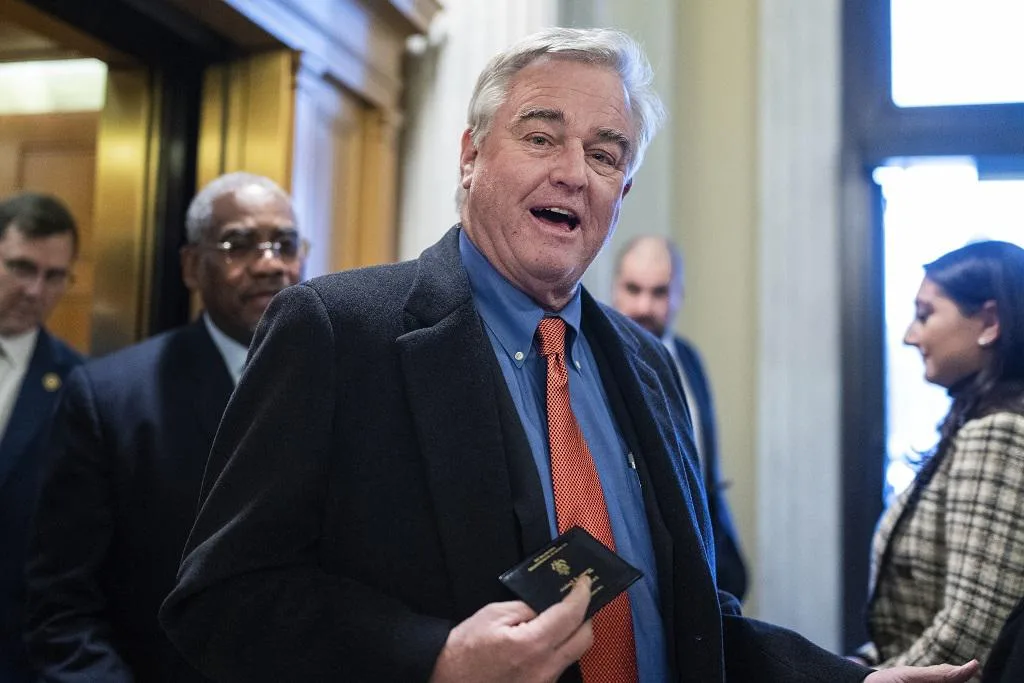
When Larry Hogan announced his bid for Maryland’s U.S. Senate seat, it immediately turned the state into ground zero for the Democratic Party’s chances to hold onto its thin majority.
To replace retiring Sen. Ben Cardin, the party will now likely have to expend significant party resources to defeat a formidable former governor on the Republican side in what previously seemed like a safe blue seat. Early polling shows that Hogan starts with a double-digit lead over his potential challengers, who are far less well known statewide.
This new political landscape has dramatically heightened the stakes for the May 14 Democratic primary, and magnified the differences between the two candidates, Rep. David Trone (D-MD) and Prince George’s County Executive Angela Alsobrooks.
What separates the two candidates has more to do with personal biography and factional endorsements than progressive versus moderate labels.
Trone is a wine mogul who runs the chain store Total Wine, dubbed the Amazon of alcohol retailers, and he has pumped an astronomical $34 million of his own personal fortune to self-fund his campaign. Outside of his own funding, Trone’s largest funder is the American Israel Public Affairs Committee (AIPAC), to which he’s been a longtime “minyan” donor.
In a surprising move, Trone joined the calls for a Gaza cease-fire fairly early on last fall, which many interpreted as an attempt to win favor with progressives. AIPAC did not rescind its endorsement but has not funded him since May of last year, according to campaign finance disclosures.
Alsobrooks, on the other hand, has come up through the state ranks and is well known in her county. But she has faced an uphill battle against Trone’s ad blitz. Her campaign’s first ad of the election draws a contrast with Trone by portraying her as a working mother versus the average U.S. senator, who is “64 years old” and “worth $16 million.”
Both candidates are in their own way trying to claim the progressive mantle, as well as win over Black communities, which are crucial to the primary vote.
As a representative of a historically Black county, Alsobrooks has a leg up there, and she is touting her experience delivering on kitchen-table issues, mainly education and economic opportunity.
To drive a wedge between his opponent and Black voters, Trone has gone on the attack against Alsobrooks for her record as a state prosecutor, painting her as too tough on crime. Trone, in turn, is playing up his credentials as a criminal justice reformer, which he insists is a personal issue.
Yet Trone’s personal experience with the legal system is purely as a white-collar offender, which is not what most people associate with the failings of the criminal justice system.
EARLY ON IN THE RACE, TRONE’S COMPANY TOTAL WINE was embroiled in a lawsuit, since settled, due to its unwillingness to cooperate with the Federal Trade Commission regarding an ongoing investigation into alcohol distributor Southern Glazer’s. The nature of the pending antitrust lawsuit would inherently feature SouthernGlazer’s dealing with Total Wine, one of the largest distributors and retailers of alcohol.
Over the course of Total Wine’s history, Trone’s company routinely flouted state anti-monopoly laws protecting consumers and independent businesses from aggressive practices by big-box chains. Across several states, Total Wine was found guilty of breaking minimum-pricing laws, leading to fines of tens of thousands of dollars or the suspension of its liquor licenses.
In response to questions about his company’s track record and the tenuous connection to a broken criminal justice system, Trone’s campaign pointed to an incident back in the 1990s where state regulators went after him and his business.
The charges were related to a scheme Trone orchestrated in Pennsylvania to bypass state restrictions on the number of liquor stores one company could set up. He enlisted his wife, brother, and several friends to set up stores in their name instead, all of which would hire Trone’s own consultancy firm to actually run the business. It was effectively a clever accounting trick that drew the attention of the state.
Trone attributes the prosecution to an overeager and corrupt state attorney general, Ernest Preate, who did later go to prison for other reasons. The case against Trone was dragged out and never led to a conviction.
“David and members of his family were wrongfully arrested and prosecuted by a career politician,” the campaign said. “David knows he prevailed in court because he had the resources to prove his innocence in a criminal justice system too often stacked in favor of the white and the wealthy.”
The circumstances of the case are certainly mired by Preate’s dealings. But what’s clear is that after that run-in with the law, Total Wine pivoted its strategy. Trone discovered he could just as easily exert political influence to preemptively change state laws that were getting in the way of his business ambitions. He’s launched extensive lobbying campaigns to deregulate minimum pricing and other restrictions against big-box liquor stores and even backed legal efforts that went all the way to the Supreme Court, which overturned Tennessee licensing rules.
“I’ve passed more laws than most politicians,” he said in an interview with The Washington Post in 2016 when he was running for Congress, regarding his lobbying prowess. “I sign my checks to buy access.”
His campaign seems to believe that these brushes with the law over his business practices make him relatable to Black voters, which strains credulity; in some sense, it’s not unlike the recent strategy that the Trump campaign has adopted to make inroads with Black communities.
“I got indicted a second time and a third time and a fourth time,” Trump said at a rally last month, “and a lot of people said that that’s why the Black people like me, because they have been hurt so badly and discriminated against, and they actually viewed me as I’m being discriminated against.”
ORGANIZATIONS LIKE THE ACLU HAVE HELPED TRONE build up this reputation as a reformer over the years, dedicating their recidivism programs in his name after he gave a $15 million donation. “Trone’s initial involvement with the ACLU was born of personal experience,” its announcement read, followed by an exoneration of his legal difficulties with state authorities.
Trone’s most powerful backer, House Minority Leader Hakeem Jeffries (D-NY), echoed Trone’s credentials as a criminal justice advocate in his endorsement statement. Jeffries’s support for Trone points to the real schism in the race, which has less to do with ideology and more with a shadow battle between national and state Democratic Party interests.
The top Washington leadership in the House Democratic Caucus supports Trone, including Jeffries, Democratic Caucus Chair Pete Aguilar (D-CA), and Minority Whip Katherine Clark (D-MA).
Meanwhile, Alsobrooks has drawn endorsements by high-profile members of the Maryland delegation, including Sen. Chris Van Hollen and former House Majority Leader and current Rep. Steny Hoyer, along with a host of state leaders whom she’s worked alongside. Most importantly, she’s won the support of Gov. Wes Moore, who is widely seen as a rising star in the party.
The underlying reasons for these battle lines are revealing.
Prior to Hogan’s entrance into the race, Trone’s main asset was as a self-funder who could save the DSCC vital resources. That was a major part of his initial appeal and even promoted by his own campaign, helping draw him endorsements.
“His deep pockets to finance a campaign is incredibly attractive to a national party … that’s his biggest advantage which has paid huge dividends,” said Todd Eberly, a political science professor at St. Mary’s College of Maryland.
A day after Hogan’s announcement, though, Trone made a pointed statement that he couldn’t keep self-funding in the face of a strong challenger, indicating that he would need the party’s help eventually in the general election. “I just can’t write unlimited checks forever,” he told a reporter.
Trone’s other value is that he’s been a prolific fundraiser for the top brass of the Democratic Party since he entered office, winning him friends and influence. Once he announced a Senate run, those favors over the years earned him high-profile endorsements from House leadership.
According to filings compiled by Open Secrets, Trone has ponied up $1.3 million to the Democratic Congressional Campaign Committee and House Majority PAC, which works on behalf of party leadership and is now controlled by Jeffries. In 2023 alone, Trone contributed $250,000 to the PAC.
Trone has additionally maxed out individual contributions to an astounding number of Democratic members over the past two election cycles, earning him over 30 endorsements from colleagues.
The same pattern appears to be true for the state endorsements he’s racked up. Trone and his wife either individually or through his campaign contributed $57,000 to state and local officials who’ve now endorsed his Senate bid, most of which came in the past year, according to Follow the Money.
“Trone follows in a long line of wealthy self-funders who rise up through their seeming generosity outside of politics, and then continue moving money around while in politics to their own advantage,” said Jeff Hauser, executive director of the Revolving Door Project.
ALSOBROOKS CERTAINLY HAS SUPPORT FROM OTHER TOP MEMBERS of the party and national figures, but many of them are associated with the state of Maryland. She’s endorsed by county executives in neighboring counties, along with numerous members of the state Senate and House of Delegates.
According to her surrogates, Alsobrooks’s endorsements reflect her state colleagues’ belief in her ability, rather than fundraising prowess. “Angela has earned support across our delegation because we’ve witnessed her incredible leadership … and [she] provides a stark contrast to Larry Hogan,” said a spokesperson for Sen. Chris Van Hollen.
Her advocates argue that despite not being able to self-fund, Alsobrooks’s long-standing state and local ties might put her in a good position to defeat Hogan, who has his own state machine that he’s built from his time as governor.
That’s not to say that Alsobrooks’s support is immune from the favor-seeking of politics, but it’s not principally financial. In 2022, for example, Alsobrooks endorsed Wes Moore, who has now provided pivotal support for her Senate bid. The two have also worked together closely as state leaders on numerous public-works projects including the highly sought-after new FBI headquarters, creating jobs in Prince George’s County. This week’s congressional funding bill provides $200 million for the new headquarters in Greenbelt, Maryland.
In an official statement, Gov. Moore’s campaign team pointed to Alsobrooks’s ability to “deliver real results for Marylanders.”
Moore has some skin in the game too by siding with Alsobrooks over a formidable candidate like Trone backed by the national leadership. “If Alsobrooks wins it’d be a huge win for Moore and would indicate that the Maryland party establishment—led by Moore—still has significant pull,” said Eberly.
Hogan’s entrance has put a magnifying glass on which candidate would be more likely to win a general election. Trone has funding and national connections, while Alsobrooks is strapped up with the state party.
As Hauser points out, though, the recent history of self-funders is actually much more mixed. As it happens, personal wealth does not necessarily make someone a good political candidate. In the 2022 midterms, just two of the ten self-funders prevailed.


